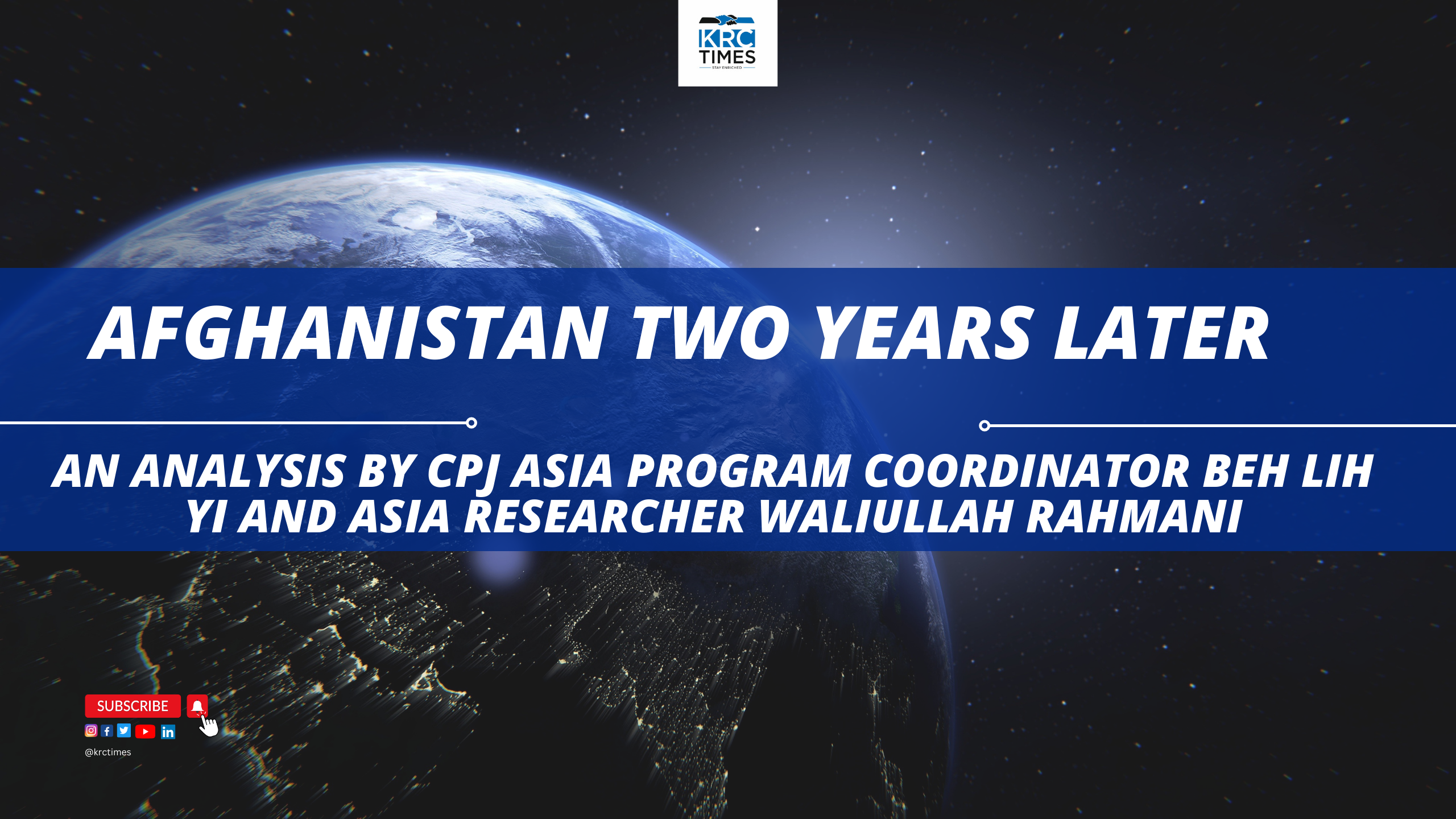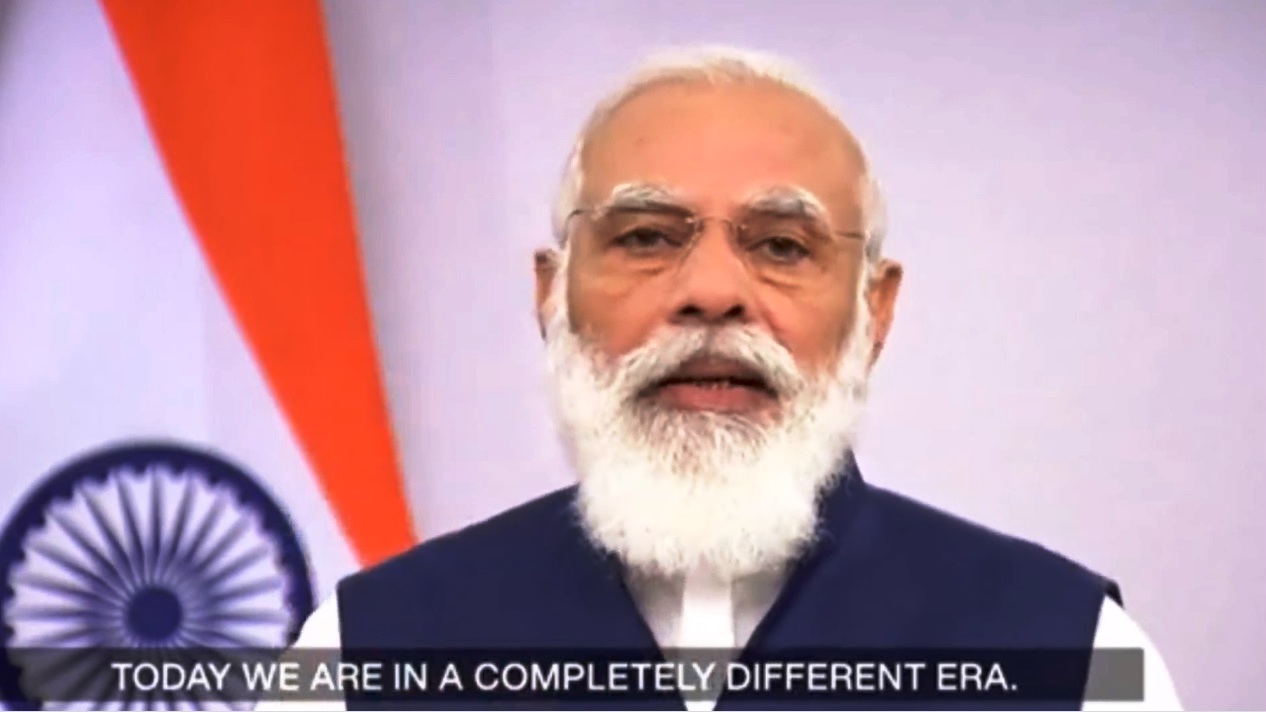“The conventional army loses if it doesn’t win, but an insurgent wins if he doesn’t lose”
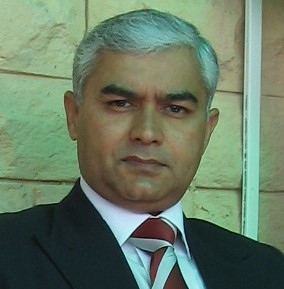 Col Deepak Kumar
Col Deepak Kumar
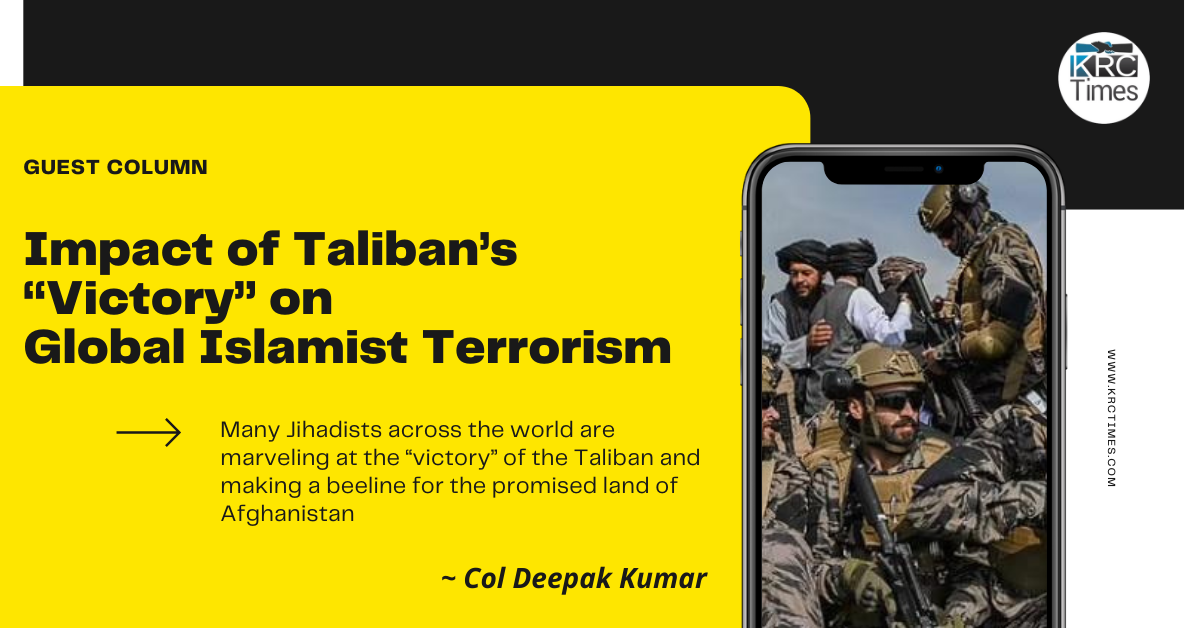
The US led Global War on Terror has had a stifling effect on most Islamist terror groups around the world since its start in 2001. However, the chaotic and haphazard US withdrawal from Afghanistan is being seen as a change in the US policy pertaining to the Global War on Terror. Taliban’s success in Afghanistan, post the US-Taliban Doha Agreement is being viewed by certain quarters, as the “victory” of the Taliban over the most powerful military in the world. Many Islamist terror groups have congratulated the Taliban on its supposed “victory”.
This development in Afghanistan has acted as a booster dose for the sagging morale of various terror groups, whose violent activities had been curtailed to varying degrees by the reprisals against them by the states and also the global coalition against terrorism. The reverberations of this victory are bound to be felt all across the world where ultra conservative Islamist Jihadi groups have their presence. Many Jihadists across the world are marveling at the “victory” of the Taliban and making a beeline for the promised land of Afghanistan, while many others are firming up plans to liberate their nations and set up Sharia compliant administrations, a la Afghanistan.
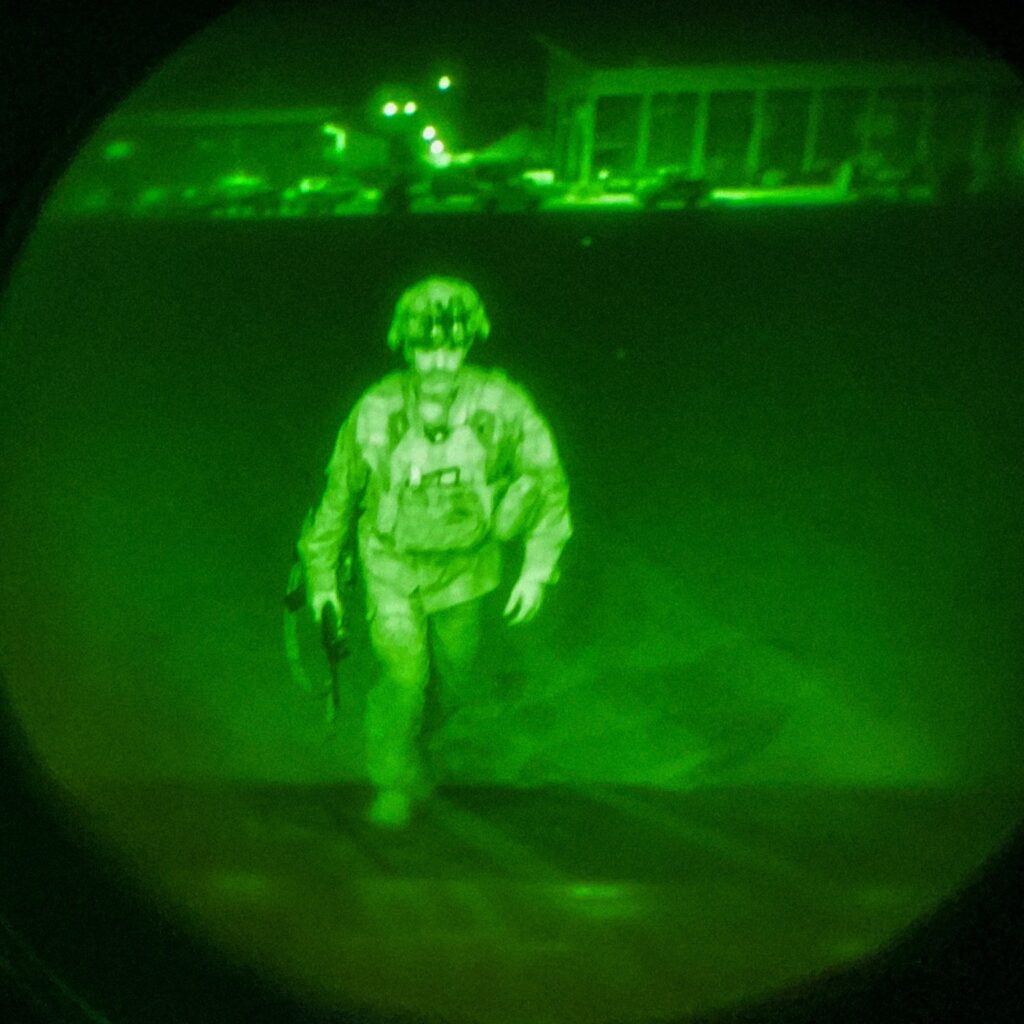
, @18airbornecorps
boards an @usairforce
C-17 on August 30th, 2021, ending the U.S. mission in Kabul.
(Source: Twitter handle of the U.S. Department of Defense)
However, the resurgence of the Taliban marks a significant change in US counter terrorism policy which would mean lesser vigor and even lesser resources being allocated for counter terrorism efforts from now onwards. Certainly, it would mean lesser boots on the ground in foreign lands and a reduced focus on countering global Jihad on the part of the Pentagon.
Apart from South and West Asia, the other places which are affected by this scourge of Islamist terrorism are the impoverished areas in Africa with weak governance structures. India has considerable political, diplomatic, and economic interests in Africa; therefore, India needs to recalibrate its strategy towards these areas after a careful analysis of the emerging security situation there.
The region worst affected by the reign of terror unleashed by these Jihadist groups in the Sahel region of Africa, Libya, Egypt, the democratic republic of Congo, Mali, Nigeria, Cameroon, Somalia, and Mozambique.
Most of these Islamist terror groups that go by various nomenclature adhere to the same Salafist strain of Islam. At some point or the other in the past, these groups have supported and declared allegiance to the major groups such as Al Qaeda, ISIS, and Taliban. In the near future, there is a likelihood of a spurt in violent Jihad by these groups across their areas of influence.
Boko Haram, officially known as Jamā’at Ahl as-Sunnah lid-Da’wah wa’l-Jihād is a terrorist organization based in northeastern Nigeria since 2002 and is also active in Chad, Niger, and northern Cameroon. This group has killed tens of thousands of people through its violent Jihad. Since the killing of its founding leader Mohammed Yusuf in 2009 by the Nigerian military, the violent acts of this group have witnessed increased sophistication including suicide bombings, attacking government offices and police buildings, and the United Nations office in Abuja in 2011.
Citing thousands of killings by Boko Haram and its linkages with Al Qaeda in Islamic Maghreb (AQIM) and Al Shabab in Somalia, the US designated and sanctioned these as terrorist organisations in 2013. In 2015, the US approved a counter terrorism aid package amounting to US$ 45 million for Nigeria and other African nations involved in fighting Boko Haram. In addition, it deployed 300 military personnel in Chad to advise these nations in their counter terrorism efforts. US allies like France and the United Kingdom have also provided financial, material, and personnel assistance to Nigeria in its counter terrorism efforts. Similarly, in 2013, France had deployed 3000 troops in Mali to fight, who continue to be deployed there to date.
With the debacle in Afghanistan, the possibility of any more boots on ground policy by the US is remote. This should be welcome news for the plethora of these Islamist groups operating in Central and Northern Africa. They will now not have to bear the consequences of the superior intelligence and lethal firepower of the US forces. The US counter terrorism efforts had earlier caused significant damage to these Jihadist groups who will now, doubtlessly, feel inspired and emboldened by the Taliban’s success in Afghanistan.
Another positive lesson for these groups from the developments in Afghanistan is that if they can survive the attrition long enough, they can ultimately wear down and defeat even a superior power like US, thereby proving an old adage, “The conventional army loses if it doesn’t win, but an insurgent wins if he doesn’t lose”. This has indeed been proved right by the Taliban by taking refuge in Pakistan and surviving for around two decades. They just faded and bided their time in sanctuaries in Pakistan. Fueled by the success of the Taliban, the ambition of these Jihadist groups to govern their respective nations on the lines of Sharia has also found new wings.
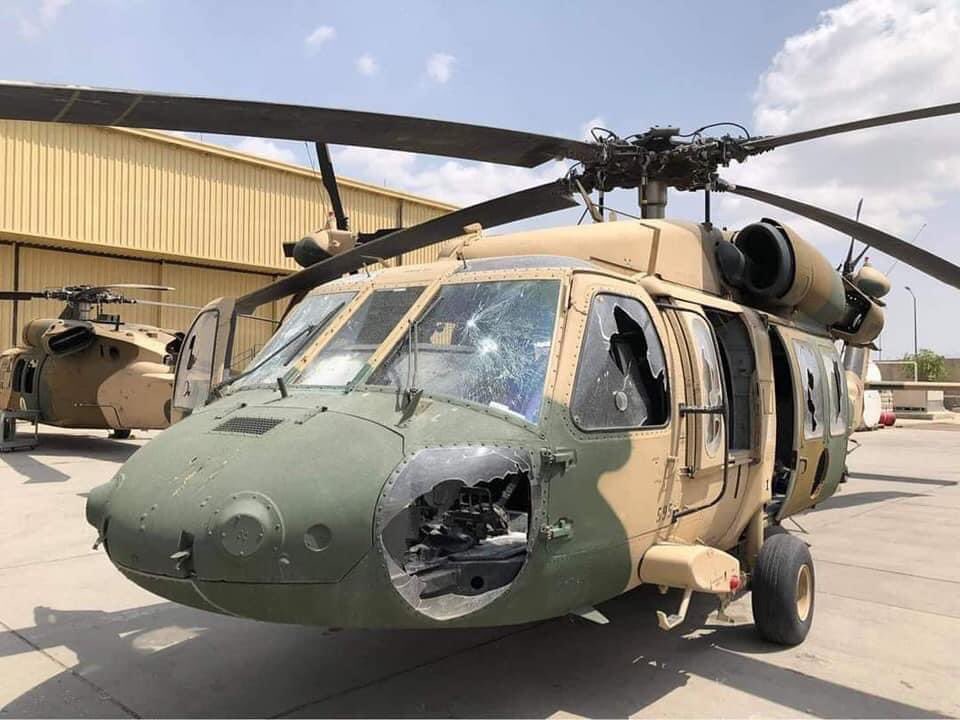
There are also lessons in this for the state power, especially France, which has been fighting the Jihadist groups in Mali. The lesson is to keep eliminating the top leadership as they emerge. This will keep the insurgency at a manageable level. Secondly, the nation building efforts should look at making democratic institutions sustainable and ensuring that the fruits of democracy and development reach the last person, the most underprivileged. Making the armed forces strong and independent enough to function without any outside power is critical to the stability and sustenance of the state.
The nation building efforts should aim at creating an inclusive cohesive society and not focus only on creating a western educated ruling elite leaving large sections impoverished both economically and educationally. It is this educationally backward and impoverished stratum of the society that provided the foot soldiers to sustain the Taliban movement in Afghanistan.
This becomes significant, especially in light of French President Emmanuel Macron’s stating recently that his country’s counter terrorism effort in Mali has developed fatigue and that France could reduce its presence there. While it is understandable that counter terrorism operations in a foreign land can tend to cause fatigue, the withdrawal should not squander the limited gains of such efforts and accentuate the security and political situation further.
Any slackening of counter terrorism efforts in North Africa will have a deleterious effect on the security situation in not only France but also other European nations. France can certainly learn from the mistakes the US made in its almost two-decade long intervention and nation building efforts in Afghanistan and recalibrate its strategy and avoid the US pitfalls. As and when France decides to withdraw from Mali, it would do well not to repeat the mistakes of US in Afghanistan.
India too has political and economic stakes in the region. India has huge economic interests in Nigeria. India is the largest trading partner of Nigeria. Also, Nigeria is India’s largest trading partner in Africa with the bilateral trade touching US $ 13.89 billion in 2019-20. Nigeria is a leading energy security partner for India. Indian owned/operated companies are the second largest employer in Nigeria after the Nigerian government. More than 135 Indian companies are currently operating in Nigeria in diverse fields such as pharmaceuticals, engineering goods, electrical machinery and equipment, plastics, chemicals, etc. India had an investment of US$ 175 million in the conventional and renewable power sector in Nigeria. If Boko Haram, which is active in Northern and Eastern Nigeria, inspired by the Taliban success and supported by other Jihadist organisation is able to extend its influence to other parts of Nigeria, it can pose a grave risk to Indian owned and operated companies as well as Indian diaspora.
India has granted more than US$ 300 million line of credit to Mali for various power generation and other infrastructure projects. While some of these projects are being undertaken by Malian public and private companies, many others are being executed by Indian companies. There are various other projects in the energy sector, agriculture, food processing, and railways that have an Indian presence.
Similarly, India has cordial relations with other nations of the region such as Chad, Niger, Mauritania, Cameroon and Burkina Faso and is keen to increase its engagement with these nations through benign developmental aid, line of credits for infrastructure development and grants in aid under the least developed countries scheme. Of late there has been a wave of liberal reforms in many deeply conservative Islamic nations led by Saudi Arabia, wherein women have been granted some rights which were considered unimaginable, only a few years back.
However, there are many impoverished Islamic nations in Africa that remain conservative and act as fertile grounds for ultra-radicalization of the youth and scouting of new recruits by various Jihadist terror groups. While the economically prosperous Islamic nations and certain non-state actors therein may provide financial support for the propagation of Jihad, it is the impoverished nations that provide the foot soldiers for these groups. There is a need to amplify these reforms in Islamic nations so that these underdeveloped and least developed nations do not fall into the lap of ultra radicals.
Any deterioration in the security situation in these countries will affect the execution of these projects. If India has to safeguard its political and economic interests in this region, it should be willing to do more than what it is already doing to ensure that the security situation doesn’t escalate to a point where its interests are irretrievably jeopardized. While India may not be capable of launching an operation of the scale and scope of the US Operation Freedom’s Sentinels, it must work with the respective states in the field of counter terrorism training, intelligence sharing, employment generation, deradicalization, education and women empowerment. India should be willing to take up these initiatives on its own as well as under aegis of international bodies.
Inspired and buoyed by the Taliban’s success, an unprecedented surge in Jihadi violence and attempt by the various Islamist terrorist groups to run over the existing governments may not be ruled out. Afghanistan will not be the first and last case, where Jihadist forces will have to be defeated by international players to protect human rights and ensure the safety of innocent citizens and uphold rule of law.
The Global War on Terror is not a mission accomplished but a work in progress and must continue to receive financial, material and manpower support of all major global powers including the US. Other measures will need to be taken to root out the oppression of human rights and restore popular democratic regimes.
The global powers and institutions need to plan now for such scenarios because any last-minute efforts can at best be akin to fire fighting. If measures are undertaken under the UN flag these will have larger acceptability. Any effort under these programmes should not only address the developmental inadequacies but the root causes that nurture Jihadi terrorism.
Modern education, gender parity, respect for rule of law and human rights should be the foundation of nation building efforts if they are to succeed. The developmental efforts should not be concentrated only in the capital and few cities, but should also reach the remote parts of the nation. Moreover, efforts should attempt to bring slow but sure changes in the conservative outlook of the outlier communities to align them with modern global values.
This can be better achieved through the empowerment of women through modern education. The protests by women we are now witnessing in Afghanistan reflect the empowerment of women in a deeply conservative society and are one of the positive outcomes of the occupation by the coalition forces, but these protests are limited to Kabul and few other cities. If such protests were to occur in all cities of Afghanistan, it would be extremely impossible for even the brutal Taliban to muffle the voices of its citizens.
If these nation building measures are undertaken under the superintendence of various expert UN agencies and it can be ensured that delivery of services percolate to the most underprivileged, a repeat of the debacle in Afghanistan can be avoided. The UN crisis management teams need to plan for such contingencies in all earnestness now when the US follies in Afghanistan and lessons to be learnt from it are still fresh unless the world has resigned to mutely witness another humanitarian catastrophe.

Col Deepak Kumar is an artillery officer. He has operated in counter insurgencies in Nagaland, Assam, and Jammu & Kashmir and also in Line of control environment. He has vast command, staff, and instructional experience in technical and tactical aspects of surveillance systems and long-range vectors. He has been the Chair of Excellence for Defence Services at Observer Research Foundation.
(This article by the author was first published in Chanakya Forum)
Advertisements | 5E For Success

5 Advantages of KRC 5E MDP program, powered by KRC Foundation.
1. Employability training
2. Internship
3. Earn while you learn ( Work Experience Certificate, subject to selection and performance)
4. 100% Cashback on Fees through Global Garner
5. KRC Membership & Placement assistance.
Send your resume to get a free profiling session and selection.
Email resume: 5eforsuccess@gmail.com
WP: 9330830083

